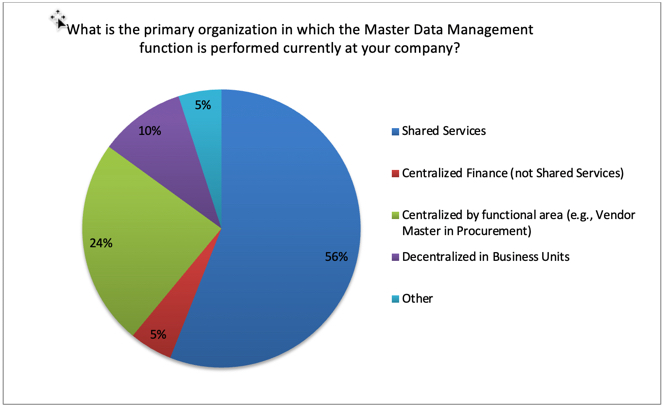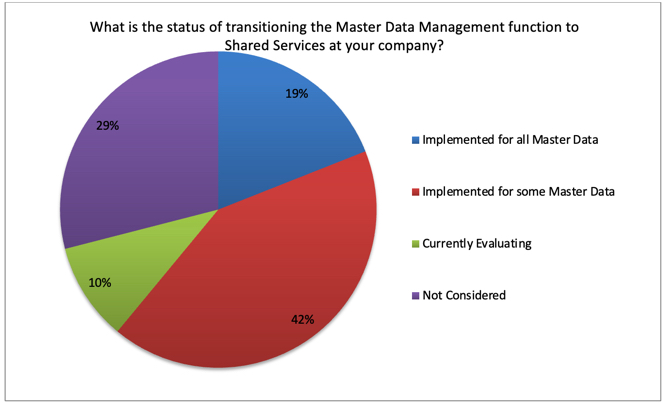Master Data Management in Shared Services / Global Business Services
Introduction
The move to Shared Services / Global Business Services for many large companies with multiple locations and business units has provided tangible benefits that go well beyond cost savings, with improvements to the accuracy and efficiency of many related work processes. As Shared Service organizations have increased the scope of their services, they are increasingly including processes that are most critical to the business, including overall responsibility for Master Data Management; the definitional structure of a business that provides a consistent framework to identify customers, suppliers, locations, hierarchies, employee data, part numbers, production information, and chart of account elements.
Creating a Global Data Administration team that has responsibility for all forms of master data can have a significant impact. Here are some of the benefits:
- Maintaining accurate master data in a timely, efficient, service-oriented manner
- Developing and maintaining global standards across all businesses
- Streamlining processes and systems associated with master data maintenance and administration
- Managing the archiving and purging of obsolete, inaccurate, and redundant data
- Educating users in the business on the impact of master data on system integration and business processes
- Developing service level agreements with individual businesses related to master data
iPollingTM Results Review
A recent Peeriosity poll created using iPolling examined where Peeriosity member’s companies manage Master Data and the status of transitioning the Master Data Management function to Shared Services.
The iPolling results indicate that 56% of Peeriosity member companies perform the Master Data Management function in Shared Services, with an additional 5% having Master Data Management performed by Centralized Finance (not Shared Services). After Shared Services, the next most popular option, at 24%, is to have the Master Data Management function performed centrally by a functional area, with different functional areas responsible for different types of Master Data. One example would be having the Vendor Master maintained and managed in Procurement. An additional 10% have the Master Data Management function decentralized in separate Business Units. Here are the details:

When we take a deeper look at Master Data Management in Shared Services, we find that only 19% of Peeriosity member companies have transitioned all types of Master Data to Shared Services, with an additional 42% reporting they have transitioned the Master Data Management function to Shared Services for some, but not all, Master Data. An additional 10% are considering the opportunity, and 29% of Peeriosity member companies have no plans to move the Master Data Management function to Shared Services.

Some comments made by Peeriosity member companies related to this poll include the following:
- Some in Shared Services (Vendor/Customer Master), some in Corporate Accounting (GL)
- The majority of our master data has been centralized within Shared Services. We have a few pieces left to bring in.
- Some portions of master data are performed outside of the Shared Services scope. For example, item setup is executed in Shared Services, however, packaging data is updated by our Packaging group which resides outside of our Shared Service organization.
- We have a Master Data Service Area and also have Financial Master data (including VMD) in Shared Services.
- Most of the Master Data management activities have been transitioned to Shared Services with only a few areas performed by the Business Units.
- All master data for our ERP systems are centralized within the Shared Services. There are other data collection teams within the business, specifically, reporting hierarchies, recipes, and planning data.
- Supplier and Customer Master Data management is Shared Services. Inventory Master Data is handled by the corporate finance team.
Closing Summary
Having a well-defined process for maintaining Master Data is critical to the smooth operations of any company, where poor processes create significant rework and errors that can ripple across all business processes. Having clear and defined ownership can be an important step toward having a world-class Master Data Management process. Shared Services / Global Business Services, is ideally positioned to have overall ownership for the Master Data Management Function, with great benefit to Shared Services processes and the overall business in all areas and functions.
Is your company performing the Master Data Management function in Shared Services? If yes, have you included all elements of the Master Data Management process?
Who are your peers and how are you collaborating with them?
________________________________________________________________________________________________
“iPolling” is available exclusively to Peeriosity member company employees, with consultants or vendors prohibited from participating or accessing content. Members have full visibility of all respondents and their comments. Using Peeriosity’s integrated email system, Peer MailTM, members can easily communicate at any time with others who participated in iPolling.
Peeriosity members are invited to log into www.peeriosity.com to join the discussion and connect with Peers. Membership is for practitioners only, with no consultants or vendors permitted. To learn more about Peeriosity, click here.

